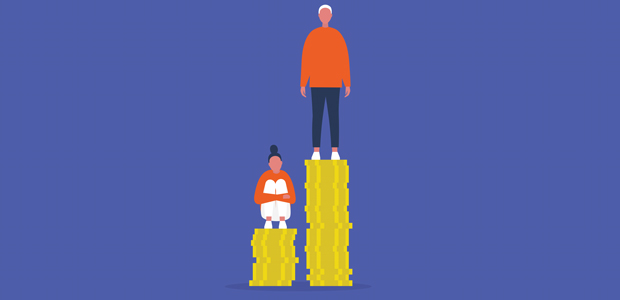
The Myth of Perceived Loss
We’ve all seen it, that moment on a gameshow where the contestant is essentially asked ‘double or nothing’. They’re nervous or excited (although, this is often the same thing), and they’re wondering, 'I can either take the £3’500 I’ve earned or gamble and go home with the jackpot.'
Flipping a coin
The crowd cheers them on, of course. It’s easier to gamble when it’s not your own money. The contestant hesitates, the host smiles, and those famous last words are said: ‘I’ll gamble’. Applause echoes through the studio, the host hugs the contestant and congratulates them – We have a show!
The contestant places three counters into the giant Penny Falls and watches with growing despondence as each, one by one, refuses to push the large jackpot counter over the bottom edge… They go home with nothing, not even the £3’500 they ‘earned’ earlier. ‘Have you had a good day?’ asks the host. ‘Yes!’ the contestant cries. Whether it’s true or not, they’re on TV, and they have to say it.
The thing is the contestant never had £3’500. They had the potential for £3’500. They also had the potential for the jackpot, arguably, but they didn’t win that, either. They came to the studio with nothing, and despite not winning any money, they haven’t actually lost anything.
All this brings us neatly to the Myth of Perceived Loss: Can we ‘lose’ what we don’t have? Can we grieve for a deal that didn’t go through, or an event that never took place? How can we ensure that we don’t become disheartened to devastation by something out of our control?
In for a penny, in for a pound
As an entrepreneur you suffer from a glut of pressures when beginning a startup. For instance, there’s the emotionally draining responsibilities of completing tasks you’re not innately built for – the pressures of introverts needing to pitch or sell, and extroverts needing to spend hours managing admin – but as you beaver away you assure yourself, repeatedly, that you’re aiming towards something. It’s all got a purpose. It’s not wasting time; it’s an investment! Right?
This makes it all the more devastating when you don’t achieve things that you set your heart upon.
Founders often confuse the spaces between themselves and their companies. You are your startup, and by extension, it is you. Quite often, you’re not selling your innovation to an investor or when you’re writing bids, you’re selling your story – the hows and whys of your idea, where it began and what it means that you’ve even begun this journey. For those of us who work in the mental health sector, in particular, these reasons are frequently deeply ingrained in personal stories about either ourselves or our loved ones, alive or lost.
This means that business ‘failures’ are often felt as personal failures. Receiving a ‘no’ from an investor or potential customer can feel like a profoundly personal rejection. You can easily fall into the trap of grieving what ‘could have been’, demanding of yourself answers why you failed.
This may cause a variety of reactions: You may begin to lose hope that your business or even yourself are of any worth, losing valuable motivation; you may double down and work ever harder, at the cost of personal relationships or health. Either way, you would be blaming yourself for something that might never have been in your direct control.
Pennies for your thoughts
The unfortunate truth is that entrepreneurs are more likely to suffer from mental health concerns and struggles – and that’s even before they begin. In fact, there’s evidence to suggest that it might be why they begin in the first place.
Clinical Professor of Psychiatry, Michael A. Freeman, found that entrepreneurs are 50% more likely to suffer from mental health concerns. In fact, according to his study, they are:
- Two times more likely to suffer from depression
- Two times more likely to have psychiatric hospitalization
- Two times more likely to have suicidal thoughts
- Three times more likely to suffer from substance abuse
- Six times more likely to suffer from ADHD
- Ten times more likely to suffer from bi-polar disorder
Add to these arresting statistics the Myth of Perceived Loss and it’s so suddenly clear to see why and how entrepreneurs work themselves to the bone, prioritising company health over personal health, and confusing corporate cul-de-sacs with somehow innate, individual dead-ends.
A penny saved…
In the game show example, it’s not so much the ‘loss’ of the £10k jackpot that’s the issue, or even the loss of the £3’500, (despite neither having ever been owned), but something much worse.
When the contestant says that yes, they have still had a great day, they’re likely running over every example in their head of how they would apply that money, just as their brain attempts to reconcile that none of it will ever happen. They’re essentially grieving what could have been.
Instead of falling into this trap, as you navigate the running of your startup, focus on what you do have, and the intangible wealth you pick up daily. You gain ever-increasing experience, greater knowledge. You can approach every new situation with a continuously smarter, cooler head on your shoulders.
Make sure to set aside time every day to recognise more subtle wins for what they are. As your business progresses, you need to recognise what it is that you have achieved – and especially so, after any moment of perceived or actual loss.
There’s no clear path to the top, despite what Hollywood, best-selling books or the more vocal successful entrepreneurs may tell (or sell) you. You will lose at times, and sometimes there will be huge losses, but even though it’s important not to deny the way that we feel about things, it is also important to stop thinking about what could have been, and return to what still could be.

